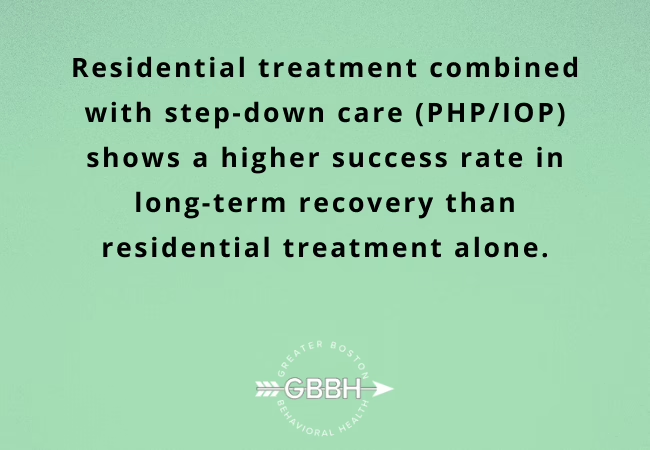Mental health treatment is not one-size-fits-all. Depending on the severity of your symptoms, the level of support you need, and your daily responsibilities, there are various types of programs that can help you achieve emotional wellness. At Greater Boston Behavioral Health, we offer a full continuum of care—from outpatient therapy to residential treatment programs—all tailored to help individuals heal at every stage of their journey.
In this blog, we’ll walk you through the different types of mental health programs available in Boston, what each level of care entails, and how to choose the right one for your unique needs.
1. Outpatient Mental Health Therapy
Best for: Mild symptoms, ongoing support, maintenance care
Outpatient therapy is often the starting point for individuals seeking mental health support. It typically involves weekly one-on-one sessions with a licensed therapist to address concerns such as:
- Anxiety or depression
- Life transitions
- Stress or burnout
- Grief or trauma
- Relationship difficulties
At Greater Boston Behavioral Health, our Mental Therapy Programs in Boston incorporate evidence-based modalities such as:
- Cognitive Behavioral Therapy Boston (CBT)
- Dialectical Behavior Therapy in Boston (DBT)
- Anger Management Therapy in Boston
- Mindfulness-based therapies
- Trauma-informed care
Outpatient therapy provides flexibility for clients who can manage daily life but want structured, professional support.
2. Intensive Outpatient Program (IOP)
Best for: Moderate symptoms, relapse prevention, step-down from higher care
An Intensive Outpatient Program in Boston offers a middle-ground between weekly therapy and more intensive treatment. Clients attend sessions 3–5 days per week, for 2–4 hours a day, and receive:
- Group therapy
- Individual counseling
- Medication management
- CBT and DBT skills training
- Psychoeducation and coping strategies
IOP allows clients to maintain work, school, and family responsibilities while getting the structure and support they need to improve their mental health. It is commonly used to treat:
- Anxiety and panic disorders
- Depression
- PTSD and trauma
- Emotional dysregulation
- Co-occurring disorders
3. Partial Hospitalization Program (PHP)
Best for: Severe symptoms without the need for 24/7 supervision
A Partial Hospitalization Program in Boston is a step above IOP in intensity. Clients attend treatment 5 days a week for 4–6 hours per day, receiving comprehensive therapeutic care, including:
- Daily group therapy sessions
- Weekly individual therapy
- Psychiatric care and medication adjustments
- Family involvement and support
- Structured skill-building with CBT, DBT, and trauma-focused therapy
PHP is ideal for individuals who:
- Are stepping down from inpatient or residential care
- Are at risk of hospitalization but still able to live at home
- Need frequent support to manage intense symptoms such as suicidal ideation, mood swings, or trauma responses
At Greater Boston Behavioral Health, PHP offers structure, stability, and clinical oversight—without full hospitalization.
4. Inpatient Treatment Program
Best for: Crisis stabilization, acute psychiatric symptoms
An Inpatient Treatment Program in Boston involves 24/7 supervised care in a hospital-like setting. It is designed for individuals who:
- Are in immediate danger to themselves or others
- Are experiencing psychosis or mania
- Require detox from substances alongside psychiatric stabilization
- Need constant monitoring and medical support
Treatment includes:
- Psychiatric assessments
- Medication stabilization
- Crisis intervention
- Safety planning
- Short-term, high-intensity therapy
The goal of inpatient care is rapid stabilization. After discharge, clients are typically referred to PHP or IOP for continued recovery support.
5. Residential Treatment Program
Best for: Long-term healing, dual diagnosis, complex trauma
A Residential Treatment Program in Boston offers live-in, non-hospital-based care in a structured environment. Clients receive round-the-clock support while participating in daily therapy, skills groups, and wellness activities.
This level of care is recommended for individuals who:
- Need long-term support to address underlying issues
- Are dealing with dual diagnosis (mental health + substance use)
- Have chronic conditions such as depression, PTSD, or BPD
- Have not improved in lower levels of care
Residential treatment focuses on deep healing, life skills development, and community-based recovery. It often includes:
- Individual and group therapy
- Medication management
- CBT, DBT, and trauma therapy
- Family counseling
- Holistic therapies like yoga, mindfulness, and nutrition
Choosing the Right Mental Health Program
It’s important to remember that no one level of care is “better” than another—it all depends on where you are in your journey. Here’s a simple guide to help:
| Level of Care | Best For |
|---|---|
| Outpatient Therapy | Mild symptoms, maintenance, first-time treatment |
| IOP | Moderate symptoms, transition from higher care, daily life balance |
| PHP | Severe symptoms, risk of hospitalization, intensive care without 24/7 stay |
| Inpatient | Acute crisis, suicidal ideation, psychosis, medical risk |
| Residential | Long-term healing, dual diagnosis, chronic or complex conditions |
Our team at Greater Boston Behavioral Health conducts comprehensive assessments to help you determine the right fit based on your symptoms, needs, and lifestyle.
How Transitions Between Levels of Care Support Long-Term Healing
One of the most important aspects of mental health treatment is ensuring smooth transitions between different levels of care. At Greater Boston Behavioral Health, we take a continuum of care approach, meaning we guide you seamlessly from one level of treatment to the next—based on your progress and evolving needs.
Examples of effective transitions include:
-
Moving from inpatient care to PHP to regain stability outside of crisis
-
Stepping down from PHP to IOP while returning to work or school
-
Continuing growth with outpatient therapy and medication management after IOP
This continuity helps clients:
-
Build upon progress instead of starting over
-
Maintain a strong therapeutic connection with consistent providers
-
Reduce the risk of relapse or hospitalization
-
Reinforce new skills in gradually less structured environments
We make sure no one leaves a program without a clear, personalized plan for what comes next.
The Role of Family and Community in Mental Health Programs
Mental health recovery doesn’t happen in isolation. That’s why our programs—especially PHP, IOP, and residential care—include optional family therapy and support services to help loved ones better understand and support the healing process.
We also encourage participation in:
-
Group therapy, where clients build peer support and reduce isolation
-
Community-based recovery events, including mindfulness groups and alumni meetups
-
Education for families, including communication skills, boundaries, and relapse prevention
By building a supportive network around the individual, we help them strengthen their recovery both inside and outside the therapy room.
Why Choose Greater Boston Behavioral Health?
At Greater Boston Behavioral Health, we don’t just treat symptoms—we treat people. Our commitment is to provide high-quality, compassionate, and individualized care at every level of treatment.
Here’s what sets us apart:
-
Comprehensive Services: We offer the full continuum—from outpatient therapy to inpatient and residential treatment—all under one trusted provider.
-
Evidence-Based Treatment: Our clinicians specialize in CBT, DBT, trauma therapy, anger management, and more to help you build real, lasting change.
-
Expert, Integrated Care: Our team includes psychiatrists, therapists, case managers, and peer support specialists working together to deliver holistic care.
-
Flexible, Person-Centered Support: Whether you’re working full time, going to school, or in need of crisis stabilization, we tailor treatment to fit your life—not the other way around.
-
A Safe and Inclusive Environment: Our programs foster respect, dignity, and collaboration so you feel supported every step of the way.
Conclusion
Struggling with mental health symptoms doesn’t mean you’re broken—it means you deserve support. Whether you’re overwhelmed with anxiety, navigating depression, recovering from trauma, or facing emotional instability, there is a program built to meet you where you are.
At Greater Boston Behavioral Health, we provide more than just treatment—we offer a roadmap to long-term wellness, with personalized care at every level: Outpatient, IOP, PHP, Residential, and Inpatient. You don’t have to walk this path alone. With the right support, healing is not only possible—it’s within reach. Call (888) 278-0716 today to take the next step toward a healthier, more empowered future.
FAQ on Mental Health Program Levels
What is the difference between outpatient therapy and IOP?
Outpatient therapy typically includes weekly sessions, while IOP involves structured care 3–5 days per week, offering deeper support for moderate symptoms.
Who is PHP best suited for?
PHP is ideal for individuals who need intensive daily treatment for mental health challenges but don’t require 24/7 supervision in a hospital setting.
When is inpatient care necessary?
Inpatient care is for individuals experiencing a psychiatric crisis—such as suicidal ideation or psychosis—and need stabilization in a fully supervised setting.
What happens after I complete a residential or inpatient program?
Most individuals step down to PHP or IOP, depending on their stability and needs, followed by outpatient therapy and continued medication management if needed.
Does Greater Boston Behavioral Health offer all levels of care?
Yes. We provide a complete continuum of care including outpatient therapy, IOP, PHP, inpatient stabilization, and residential treatment.


